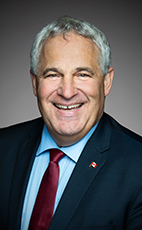44th Parl. 1st Sess.
February 15, 2024 10:00AM
- Feb/15/24 1:56:36 p.m.
- Watch
Mr. Speaker, I am struck with how, during this debate, we have heard so much technical and bureaucratic language from the government. It masks what is fundamentally an ethical and moral issue, that is, the just way to treat the most vulnerable within our society. This discourse about maybe we are not ready or maybe we will be ready masks the more important underlying question of whether we should ever have the state involved in facilitating the suicide of those with mental health challenges. On this side of the House, we say a firm no, not now, not ever.
I want to ask the member if he is concerned about the dramatic growth in the rates of those opting for MAID in Canada, opting for it perhaps under pressure or in other circumstances. We have seen, since this practice started in Canada, dramatic increases every single year. Is the member concerned about that, or is he totally fine with this idea of exponential growth in the rates?
167 words
- Hear!
- Rabble!
- add
- star_border
- share
- Feb/15/24 1:57:41 p.m.
- Watch
Mr. Speaker, I am concerned about it. I do not know what it means and there is much disagreement as to what it means.
I would ask a question of the member, which I know he will not have to answer under the rules. Is he okay with track one MAID? A lot of the psychiatrists who went before the committee who were not in favour of MAID for mental disorders were in favour of track one and track two. I would like to know if the member accepts MAID under any circumstance or not at all.
It is an important ethical and moral decision, I agree, but no one in the House wants people to suffer needlessly, and I think we are all grappling with this on moral and technical grounds. It may not be possible, I cannot say, but we want to separate out suicidal ideation. We want to be able to separate out psychosocial factors as motivating factors for requesting MAID in cases of mental illness, and we are not there yet.
We want to study treatment fatigue to see, if somebody says they are done and cannot take it anymore, whether we can guide them to another treatment. We have looked at treatment fatigue when it comes to HIV and type 1 diabetes patients, but we have not looked at treatment fatigue when we talk about psychiatric illnesses.
232 words
- Hear!
- Rabble!
- add
- star_border
- share
- Feb/15/24 1:59:20 p.m.
- Watch
Mr. Speaker, we know that medical assistance in dying is a deeply personal issue that is very difficult.
I wonder if my hon. colleague could talk about the fact that we need to base this on principles of personal autonomy, dignity and choice.
43 words
- Hear!
- Rabble!
- add
- star_border
- share
- Feb/15/24 1:59:41 p.m.
- Watch
Mr. Speaker, that is a very difficult question.
We all believe in personal autonomy and choice. However, as I said in my speech two days ago, sometimes I think that is becoming a bit of an ideology, where we do not recognize that, yes, we are individuals with free will and free choice, but we are born into families and communities. We are influenced not only by the opportunities that families and communities afford us, but also by the constraints they impose upon us. In some cases, society imposes more hardship on some than others.
We do not seem to be able to separate out whether somebody is asking for medical assistance in dying because of the hardships that society has imposed on them, or whether it is really a clear-eyed decision. I am not a psychiatrist. I am not a doctor. I do not approach this with—
150 words
- Hear!
- Rabble!
- add
- star_border
- share
- Feb/15/24 2:00:39 p.m.
- Watch
I hate to shut the hon. member down, but we are out of time.
14 words
- Hear!
- Rabble!
- add
- star_border
- share
- Feb/15/24 2:00:54 p.m.
- Watch
Mr. Speaker, this year, CanNor celebrates 15 years of supporting job creation and economic growth in the territories.
Project by project, CanNor's support empowers innovators in our territories.
Because of CanNor, 12 indigenous businesswomen in Yukon were able to kick-start or grow their businesses through a microloan program.
Thanks to CanNor, the Sakku Investments Corporation, an Inuit business, can build homes throughout the year in Nunavut in its modular home plant.
Thanks to CanNor, businesses such as ColdAcre Food Systems and Sarah's Harvest were able to expand their operations to improve northern food security.
Thanks to CanNor, Makerspace YK was able to renovate a commercial space and turn it into a collaboration centre for Northwest Territories entrepreneurs.
Thanks to CanNor, community spaces such as the Yukon Theatre, Heart of Riverdale Community Centre and the Pine Lake trail in Haines Junction will receive upgrades for all Yukoners to enjoy.
The work of CanNor is leaving a lasting legacy in the north, but there is more to do and our government will continue to be there to support northern businesses and innovation.
184 words
- Hear!
- Rabble!
- add
- star_border
- share
- Feb/15/24 2:01:56 p.m.
- Watch
Mr. Speaker, on February 17, the Republic of Kosovo celebrates its 16th year of independence.
Kosovo's path to independence was not easy. During its fight for freedom in 1999, tens of thousands of Kosovar Albanians were killed, and tens of thousands more became refugees. Their stories of tragedy and suffering are really hard to hear. However, the Republic of Kosovo has always had a friend in Canada. Canada was one of the first nations to recognize Kosovo's independence in 2008, and Canada welcomed over 7,000 Kosovar refugees into Canada, including my fiancée and her entire family.
Twenty-five years later, those former refugees have built lives here in Canada. They have enriched Canada with their culture, their hard work and their love of Canada. To all Kosovar Canadians, I say urime Dita e Pavarësisë.
142 words
- Hear!
- Rabble!
- add
- star_border
- share
- Feb/15/24 2:03:00 p.m.
- Watch
Mr. Speaker, PacifiCan plays a vital role in communities across British Columbia. It partnered with New Relationship Trust to work on the B.C. indigenous clean energy initiative and invest $4 million to support indigenous communities, create good and sustainable jobs, and move toward clean and reliable energy.
This investment is also supporting over 100 projects by providing an additional $140 million in collaboration with various partners. These projects have created over 1,000 jobs and have reduced emissions by more than 400,000 times. This shows the important work that the federal government is doing in B.C. by working with people, indigenous communities and local businesses. Together, we are creating lasting economic benefits while advancing reconciliation and fighting climate change. The role that PacifiCan plays in the economy of British Columbia is important, and it must continue to have our support.
143 words
- Hear!
- Rabble!
- add
- star_border
- share
- Feb/15/24 2:03:54 p.m.
- Watch
Mr. Speaker, from February 12 to 16, we celebrate Hooked on School Days. This year marks the event's 20th anniversary.
As a former school principal, I greatly appreciate the continued efforts by teachers, support staff and everyone else who takes an active part in ensuring young people's academic success.
I want to pay tribute to the great work done by everyone who is involved in this amazing adventure that we call school.
I specifically want to highlight an initiative by the Centre de services scolaire des Mille-Îles, which is presenting the third annual Lumina awards. Fourteen members of the education community—teachers, employees, students, parent volunteers or partners—will be recognized through these awards.
This recognition is one of the many small gestures that celebrate the school system and encourage young people to stay hooked on school.
144 words
- Hear!
- Rabble!
- add
- star_border
- share
- Feb/15/24 2:04:57 p.m.
- Watch
Mr. Speaker, our government is investing in and strengthening the economic prosperity of today and tomorrow. As a proud northerner and a rural MP, I have travelled and experienced first hand the resilience, innovation and creativity of northern Ontario communities. I have seen innovation and new ways of exploring critical minerals extraction to help fuel our transition to a zero-carbon economy that respects the environment and includes indigenous communities in true partnership.
Last week, I was in Cobalt with the member for Nipissing—Timiskaming to highlight a historic $5-million investment from FedNor to Electro Battery, a company that will support building over 1.5 million electric vehicles in Ontario.
I visited some businesses that we supported, like breweries, restaurants and tourism operators. Their important contribution is helping boost the economies of small towns in northern Ontario, a great place to call home. I want to thank them for sharing their success stories and for contributing to northern Ontario's prosperous future.
164 words
- Hear!
- Rabble!
- add
- star_border
- share
- Feb/15/24 2:06:10 p.m.
- Watch
Mr. Speaker, on behalf of the Standing Committee on Access to Information, Privacy and Ethics, I rise today in tribute to former conflict of interest and ethics commissioner Mary Dawson, who passed away on December 24, 2023.
Mary Dawson was not just the former ethics commissioner. Her fingerprints are all over very important parts of our history, including the drafting of the Access to Information Act, the Privacy Act, the Canada Health Act, the Official Languages Act, the Competition Act, the Customs Act and the Young Offenders Act.
She was made a member of the Queen's Counsel in 1978 and became associate chief legislative counsel in the early 1980s. Aside from being the associate deputy minister of justice for nearly two decades, she was particularly proud of her constitutional work, including being the final drafter for the patriation package on the Constitution Act, 1982, and the Charter of Rights and Freedoms.
The job of a good conflict of interest and ethics commissioner is to make members of all the parties equally uncomfortable. She did her job well.
Mary Dawson was a remarkable person, and Canada has been well served by her contributions.
Our condolences go out to her family on the passing of a remarkable Canadian, Mary Dawson.
210 words
- Hear!
- Rabble!
- add
- star_border
- share
- Feb/15/24 2:07:27 p.m.
- Watch
Mr. Speaker, small businesses are the backbone of the Canadian economy. The government is committed to making strategic investments through the My Main Street program so that local businesses and communities can thrive.
A concrete example of the success of this program can be found right here, in my riding of Ottawa—Vanier. The Vanier BIA, which represents 400 members, created the Vanier HUB by transforming a parking lot into a unique artistic space where the community can gather.
The Vanier HUB focuses on inclusive and integrated programming that draws arts, culture, sports and community engagement for under-represented communities. The funds allowed the HUB to grow its resources and resulted in more than 10,000 event attendees, creating a significant impact on Vanier businesses.
The good news is that the Vanier HUB received the Downtown Achievement Award from the International Downtown Association last fall in Chicago. I am proud to share that, very soon, businesses will be able to apply for funding through My Main Street 2.0.
170 words
- Hear!
- Rabble!
- add
- star_border
- share
- Feb/15/24 2:08:37 p.m.
- Watch
Mr. Speaker, Canada Economic Development for Quebec Regions is increasing the productivity and competitiveness of Quebec businesses.
Although the Conservatives voted against funding for programs that support Quebec businesses, our government is helping to grow Biodextris, a Vimy-based company advancing innovative drug research; BOSK Bioproducts, a manufacturer of compostable bioproducts; and Cintech agroalimentaire, an accelerator of sustainable development.
As we know, the future of our economy depends on the growth of our businesses.
74 words
- Hear!
- Rabble!
- add
- star_border
- share
- Feb/15/24 2:09:28 p.m.
- Watch
Mr. Speaker, after eight long years of the Liberal-NDP government, Canadians are tired, ticked and overtaxed. The Liberals continue to fight to keep this punitive and ineffective carbon tax, which goes up again on April 1. In reality, they are fighting to keep grocery prices high and biting the hands that feed us. When we tax the farmer who grows the food and we tax the trucker who ships the food, we tax all Canadians who buy the food.
The cost-of-living crisis is fuelled by the government's overspending and its punitive taxes placed on Canadians, including our seniors who are struggling to make ends meet on their fixed incomes.
These high grocery prices, taxes and inflation are driving Canadians to food banks in record numbers. The use of food banks in my area alone is up year over year, with one food bank reporting triple the demand since the same time last year.
Enough is enough. Canadians need relief, and they need it now. Let the farmers farm, let the truckers truck, let the workers work and let Canadians get back on their feet again. It is time to axe the tax, and bring it home.
200 words
- Hear!
- Rabble!
- add
- star_border
- share
- Feb/15/24 2:10:36 p.m.
- Watch
Mr. Speaker, did you know that through the Atlantic Canada Opportunities Agency, or ACOA, our government has invested more than $2.6 billion in 14,000 projects since 2015?
Today I want to highlight the support to our francophone and Acadian communities. Over the past year, we have allocated more than $15 million to projects to strengthen the vitality of those communities. Our commitment goes beyond financial support; the ACOA actively participates in initiatives such as promoting francophone immigration, while continuing to promote our communities and helping them grow.
I am proud of my government for its commitment to the region and its support to our linguistic communities in eastern Canada.
113 words
- Hear!
- Rabble!
- add
- star_border
- share
- Feb/15/24 2:11:36 p.m.
- Watch
Mr. Speaker, after eight years, the NDP-Liberal government has lost touch with reality.
It has an official policy to make energy more expensive. In 45 days, it will be increasing the carbon tax, again. It will keep increasing the carbon tax as long as it clings to power. People are hurting, but the socialist coalition just does not believe what Canadians are telling it. Instead, it lectures Canadians about their moral failings.
Now those proud socialists have announced a new official policy of building no more roads. They think that Canadians will not need roads once their Soviet-style electric car mandate makes buying a car unaffordable. They think Canadians will not need cars to buy groceries once their plastic-packaging ban makes food unaffordable. They think Canadians will not need food when nobody can afford a home with a kitchen. They think all we need is a tent and a safe supply of heroin.
The Prime Minister is not worth the cost.
164 words
- Hear!
- Rabble!
- add
- star_border
- share
- Feb/15/24 2:12:33 p.m.
- Watch
Mr. Speaker, after eight years of this government, the cost of rent has doubled in Canada and tripled in Montreal, which means that Canada has the worst record in the G7. Meanwhile, we are the ones with the most land on which to build. This sad record shows that, in 2022, Canada built less housing than in 1972.
It is time to implement incentives to increase the construction of housing across Canada. With a view to doing just that, my leader was in Montreal this morning to announce his common-sense housing plan. He is proposing to give federal bonuses to cities, such as Saguenay, Victoriaville or Trois‑Rivières, that are successfully accelerating housing construction and to exempt small municipalities from penalties, while giving them the right to bonuses if they exceed the 15% target.
Things need to change. After eight years under this government, it is high time we put our common-sense plan into action.
160 words
- Hear!
- Rabble!
- add
- star_border
- share
- Feb/15/24 2:13:39 p.m.
- Watch
Mr. Speaker, in Kitchener—Conestoga, the township of Wellesley ranks as one of the best places to live in Canada. There is a close-knit bond forged among neighbours and a sense of community and meaningful relationships in every aspect of daily life.
Small and rural townships hold an undeniable charm, encapsulating the essence of tranquility and interconnectedness with nature. With living in a rural community comes the challenge of a different type of connectivity, Internet.
I am proud of the investments made in Wellesley and throughout Kitchener—Conestoga through the universal broadband fund, delivering high-speed Internet to thousands of Canadians, households and businesses in Kitchener—Conestoga.
We are on track to meet our goal to help connect 98% of Canadians to high-speed Internet by 2026. We will keep investing to ensure that Canadians have affordable, high-quality and high-speed Internet for work, school, health care and to stay connected with family and friends.
By bridging this digital divide, we are enabling farmers, small businesses, artists and entrepreneurs to live in communities like Wellesley, with the world as their customers.
186 words
- Hear!
- Rabble!
- add
- star_border
- share
- Feb/15/24 2:14:46 p.m.
- Watch
Mr. Speaker, Canadians are horrified as they witness, in real time, the killing of over 28,000 Palestinians, 67,000 injured and millions displaced.
This week's attack on Rafah, a refugee camp, is a clear sign that the far-right extremist government of Netanyahu will stop at nothing.
President Biden, the Prime Minister and other leaders asking the government of Israel to protect civilian life in the face of genocide has become farcical. Canada's latest joint statement in favour of an immediate ceasefire means nothing without concrete action.
It is time for Canada to cut off the supply of arms to Israel; stop the political legitimization of the Netanyahu government; reinstate funding for UNRWA, the only ones who can do the life-saving work needed; support the UN and UN agencies; and support the establishment of a Palestinian state.
History will judge us not by our words but by our actions. The government is not on the side of peace and justice, but rather complicity and genocide. It is time to act.
174 words
- Hear!
- Rabble!
- add
- star_border
- share
- Feb/15/24 2:15:47 p.m.
- Watch
Mr. Speaker, last month I travelled to Nunavik to discuss the concerns of the people living in the northern part of Abitibi—Baie‑James—Nunavik—Eeyou.
For a long time, the Inuit of Nunavik have been demanding an official apology from Ottawa. The federal government slaughtered sled dogs in the early 1950s and the community wants compensation. They reached an agreement with Quebec over 10 years ago, so why is it taking so long with the federal government?
In 2019, the federal government apologized for the dog slaughter that occurred in a Nunavut community and offered them $20 million in compensation. Nunavut received compensation, but Nunavik did not. Why are the two being treated differently?
The Inuit in Nunavik should, at the very least, be offered the same compensation. Like the residential schools and deportations, this is an event that has marked the lives of Inuit people for generations.
I call on the government to make an official apology to the Inuit people of Nunavik as soon as possible and provide them with compensation.
178 words
- Hear!
- Rabble!
- add
- star_border
- share




















